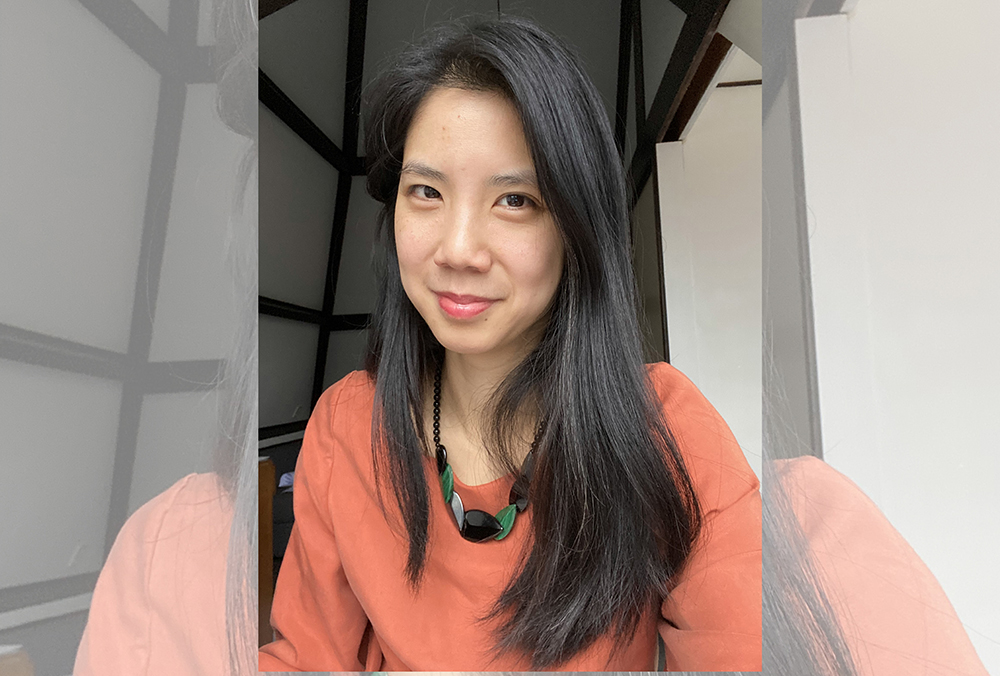The opportunity to spend time getting to know yourself and understanding your motivations has been an upside of pandemic lockdown, according to Kate Ng from The Netherlands. She said accepting the curfew, knowing we just have to deal with it because there’s nothing we can do about it, makes it easier. “I can just get to know myself really well, get to know the things that make me tick and things that irritate me, and then I can manage better in my everyday life.”
Kate is a sewist and since moving from London in 2019 has converted her former corporate life into a sewing life working for a magazine, blogging, pattern-editing and teaching sewing online and in person (when possible). She encourages people to sew because then they have more connection and understanding of how clothing works. And sometimes they find it’s actually quite magical that they can turn a flat bit of fabric into something that they can wear. “It’s a life skill, a bit like cooking. You just learn it and get good at it. It’s really good for your mental health too. Like gardening as well, it’s got that same kind of therapeutic effect.”
She says you don’t need a lot of fancy equipment. A sewing machine, scissors and thread is enough to get started. Then you’ve just got to do it. “Like any hobby, there’s so many things you can buy. You can buy the best saucepans in the world or the best frying pan but if you don’t know how to fry an egg and what temperature you’re meant to use, then it’s not going to happen. Same with sewing, it’s just trial and error.”
Kate sews because she enjoys being able to make things that can’t be bought in shops. “When you shop you’re dictated by what someone else has already put there, that’s the selection. So using a cooking analogy, again, it’s like going into the store and seeing all the ready meals, and the meal kits that you could make. Or you go to the fresh and raw ingredients sections, do it yourself and have exactly what you want.”
“I don’t make everything that I wear. I’m a big fan of second-hand fashion platforms, there’s one called Vinted that’s popular in Europe, where people sell off their clothes. Sewing is definitely a luxury because of the cost of craft materials. If you buy them as raw materials, you are buying as the end consumer and pay retail price for your fabric, your thread, your buttons. And that’s going to be sometimes more expensive than the finished garment you buy in the store. So it’s not about what’s cheap, and what’s good, it’s about what you personally want to have, and therefore make yourself.”
Kate believes sustainability has become a more mainstream concept but whether people are doing what they say they will is a different idea altogether, especially when there’s a price point involved. “For someone who might have bought a lot of fast fashion previously, a sudden switch to sustainable fashion may not be an affordable price point. And when it comes to the crafting community, people don’t always craft because they want to be sustainable. People craft because it’s good for their mental health and they like to do something with their hands and it’s really rewarding. So whilst there is a lot of chat around sustainability, it’s more around reusing and repurposing. What can you upcycle that you already have? Can you reuse all your scraps? Can you use a pattern that uses all of the fabric, that’s zero waste, rather than, for example, if you cut out a skirt that’s in a circular shape, and you’ve got lots of leftovers (but you can do something with them later). What I like about crafters is that they are very resourceful, they don’t like to waste things that they’ve already spent the money on.”
“I think the conversation about sustainability is more mainstream now, but actually implementing change at scale is a difficult thing. And to be honest, you can worry about sustainability in your clothes, but I’d also much rather you didn’t get on a plane, or you switch to green energy in your home. There’s bigger things that we could be doing on an individual level to be making an impact. But if you’re thinking about it and engaging in some way, then that’s a good start.
“I was quite hopeful for some kind of sustained lasting change at the beginning of the pandemic. Because it was such a sudden change for all of us, it felt like a really good opportunity to rethink whether it’s our economic systems on a more local level, and people’s behaviour. But I think the longer the pandemic wears on the more people start to really get COVID fatigue. And when you have fatigue in this way, you often just want things to go back to the way they were. I don’t really see a massive shift, but I hope that we will continue on the path of sustainability and behave in a more environmentally sound and socially just manner.”
